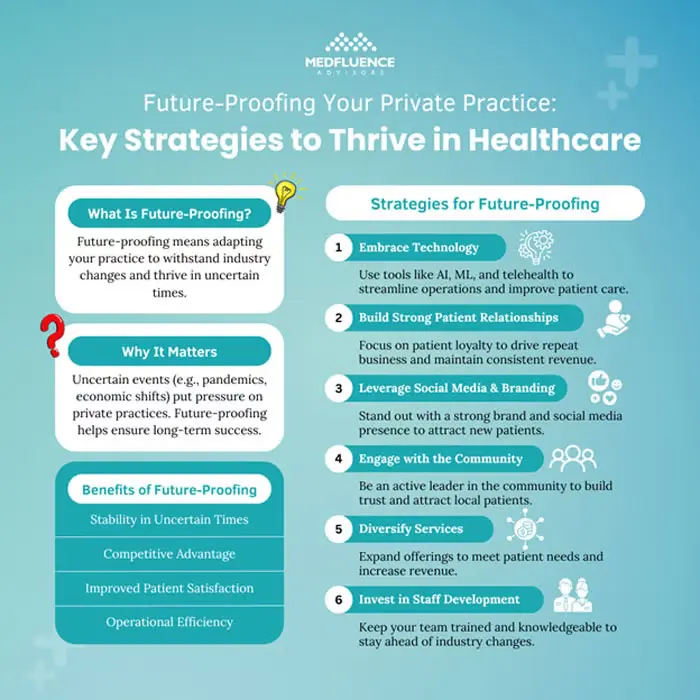Future-Proofing Your Practice in 2024
Today’s modern healthcare landscape is rapidly evolving. Private healthcare practices face an array of challenges that make it difficult to survive the competitive industry that is healthcare.
The private practice sector is often met with intense pressure from the rest of the industry. There is a huge challenge to stay relevant amidst the rising competition. There is competition not only with other private practices but also competition with hospitals owned by much larger health systems and business entities.

As physicians and private practices continue to navigate the ever-changing world of healthcare, they must know by now the importance of keeping with the times. Part of the need to stay relevant and competitive is future-proofing your practice.
In this white paper, we will go into full detail about what future-proofing is, what it entails, how it will benefit your practice, and what steps you should take to implement a strategic plan to future-proof your practice.
Understanding Future-Proofing
Competition in the healthcare industry has been more intense than ever before. Patients now have more options: big hospitals, small private practices, or even telehealth.
Practices that want to remain relevant in this competitive landscape must take proactive steps to embrace the digital age that’s slowly but surely becoming the norm in healthcare.
Before we dive into what independent practices can do to future-proof their businesses, let’s go over what exactly this means.
What Is Future-Proofing?
In the context of the healthcare industry and medical practices, future-proofing is the process of designing your medical practice business to anticipate, withstand, and minimize the possible impacts of unanticipated future events and the changes they may bring to the healthcare industry.
The healthcare industry is an especially evolving landscape and being able to keep up with the changing times is crucial to stay relevant and competitive in the face of all these changes.
Future-proofing a practice is more than just survival, it’s about positioning your practice as an irreplaceable organization in the industry.
What Does It Mean to Future-Proof Your Practice?
In the past, healthcare systems, organizations, and private practices could create year-long plans and execute them with minimal disruption. But today’s rapidly evolving healthcare landscape makes it impossible to predict the future with the same certainty.
To remain relevant and competitive, practices must adapt to shifting patient expectations, technological advancements, and an increasingly unpredictable world. Future-proofing is all about embracing change and innovation. What worked before may no longer be effective. By meeting these challenges head-on, your organization can not only withstand them but also thrive, setting the stage for long-term growth and success.
Why Future Proofing Matters to Private Practices?
The world is experiencing very uncertain times – the COVID-19 pandemic would attest to this. Viruses, global pandemics, natural disasters, and economic and political shifts can shake the entire healthcare industry. This uncertainty and changing times can put a lot of pressure on private practices.
Add the pressure of competing with bigger hospitals and healthcare systems, it’s more important than ever for private practices to future-proof their organization.
In the past, healthcare organizations could rely on year-long plans with few disruptions. But today’s fast-changing landscape makes future predictions far less certain.
To stay competitive, practices must adapt to evolving patient needs, technological advancements, and a world full of unpredictability. Future-proofing is about embracing change and innovation. What worked before may not work now, and by facing these challenges proactively, your organization can thrive and pave the way for sustained growth and success.
The Failure to Future-Proof: What It Means for Businesses
No business is immune to change, yet many healthcare organizations fail to future-proof or underestimate its importance. Those that resist adapting risk being left behind, especially as today’s patients expect more and are increasingly digital-savvy. Practices stuck in the ‘traditional’ approach may struggle to stay profitable and could eventually face closure.
By embracing digital strategies and social media marketing, organizations can reach new audiences and grow. Future-proofing isn’t just about survival—it’s about thriving in uncertain times.
Key Strategies to Future-Proofing Your Practice
Future-proofing your private practice is easier said than done. Making changes in how things work can be scary and risky, which is why many businesses tend to skip them and don’t even consider what can be done.
But as we’ve gone over above, future-proofing your practice is crucial to staying competitive in the healthcare business. Here are key future-proofing strategies you can implement into your practice:
-
Don’t forget your organization’s core
It would be pointless and risky to change your organization’s core practices and functions completely. This will only lead to a loss of your organization’s identity.
Remember your organization’s core in strategizing a plan to future-proof your practice. Plan a strategy that allows you to adopt innovations and improvements in your organization without changing its core brand, personality, practices, functions, and operations.
-
Build strong patient relationships
Business owners will agree that it’s easier to convince an existing client to buy more of the products and services they offer than it is to convince a new client to buy into their business. It takes more effort to convince a new audience or potential client that the products and services you offer are worth their money.
Additionally, it costs a lot more to convert potential leads into new customers than it is to retain existing customers. It also takes a lot more time and effort.
Build a strong relationship with your patients and clients. This will get them to rebook and revisit your practice when a need arises. Recurring patients will equal recurring revenue for your medical practice business.
-
Build a brand and stand out from the competition
The healthcare industry is crowded and saturated with competition. Medical practices must distinguish their practice from the competition to acquire and retain patients.
Medical and private practices must build a brand that will make them stand out.
Leverage social media channels, content creation, and community initiatives to give your organization a strong brand and personality that your audience can relate to. Building a strong personal brand builds patient trust and loyalty that will go a long way in patient retention and strengthening your business.
-
Engage with your local community
It’s not enough to only develop a brand online and on social media. Your organization will benefit from engaging with and developing meaningful relationships with your local community. A positive presence in your community will help your practice’s community reputation, which is crucial for attracting and acquiring new patients.
Additionally, this will establish your practice as a health professional and a leader in the community whom the people see as a trusted source for healthcare information and medical services.
-
Leverage technology advancements and business tools
The world is experiencing a major digital shift and it has been going on for years. Businesses are moving towards digital in reaching out and communicating with their audiences, especially during the height of the COVID-19 pandemic and well after that. The healthcare industry is not being left behind in this regard as well.
Healthcare organizations and medical practices must learn to adopt technology into their business systems. Using technology will help organizations reach more of their target audience, increasing the potential to convert more leads into actual patients.
Having a strong online presence will also allow patients to reach your organization more easily and conveniently. When your target feels at ease and comfortable with reaching you, they are more likely to complete conversion into actual patients of your practice.
Additionally, leverage business tools to jumpstart your business operations and lessen the burden on your medical staff. Tools like AI (artificial intelligence) and ML (machine learning) help with staff productivity by automating often repetitive administrative tasks. This unburdens your medical staff so they can focus on providing care and enhancing patient outcomes and experiences.
AI, ML, and task automation can also ease staff burden on administrative tasks like billing, appointment scheduling, follow-up messaging, and form and waiver paperwork.
With the right business tools, you can further improve staff productivity and minimize staff burnout.
-
Adopt telehealth and remote care into your practice

Telehealth has played a crucial role in providing healthcare and important consultations during the uncertain times of the COVID-19 pandemic. During a time when face-to-face contact was limited, it allowed physicians and doctors to meet with their patients virtually and provide medical consultations without having to meet face-to-face.
Even after things went back to normal and many businesses went back to normal operations in a post-pandemic world, telehealth did not take a step back. Because of the convenience it offers to patients, many healthcare organizations still offer the service to their clients.
If you still haven’t implemented the same in your healthcare organization, it isn’t too late. Adopt and embrace telehealth and gain the opportunity to expand your practice’s reach and improve patients’ access to convenient and effective healthcare.
-
Expand and diversify your services
The healthcare industry is competitive and it is imperative for your private practice to position itself as an irreplaceable part of it. You can achieve this by expanding and diversifying the services you offer.
Aside from the traditional patient consultation services, look into expanding your services to include other healthcare services and specialized treatments that could add more to your business revenue.
When you show your audience that you have a lot more to offer than what they expected, this gives you an edge over your competitors.
In line with this, conduct patient interviews and ask for their feedback on what they would like to see your practice offer soon. This will tell you what your community needs so you can ensure that you can provide these needs. This will make you an irreplaceable part of the community down the road.
-
Elevate patient experience and value-based care
The ever-changing healthcare landscape includes changing patient expectations. Today’s modern patients are smarter and expect more from their healthcare providers. Rather than simply going to the clinic, getting the service they want, and going out of the clinic as a clear pattern, patients want relationships with their doctors and value-based care.
Patients want to be seen and heard as people who need medical attention instead of as numbers in a business, as symptoms, or as medical statistics. Patients want medical care from physicians who actually care.
Treat your patients as people and always deal with them with empathy. Bridge gaps and build personal relationships. This will allow your organization to provide personalized and value-based care.
Additionally, patient feedback and reviews are crucial for businesses, especially for healthcare organizations that work with people and real conditions.
Listen to what your patients have to say and make necessary changes and adjustments to how your organization operates. Doing this will give you valuable information that can help in improving patient experiences.
Look into conducting surveys, feedback forms, and face-to-face interviews can provide these valuable insights.
-
Review your marketing and advertising approach
The private practice sector has always been in intense competition with big hospitals, health systems, and other private practices in the community. Add to this the intense pressure that is slowly crushing many private practices around the country.
Marketing and advertising solutions will connect practices to patients who need their services while bringing in the numbers to keep healthcare organizations and practices in business.
Rethink and review your organization’s marketing and advertising approach and strategies.
While traditional marketing strategies worked well in the past, they may not be enough to bring your brand in front of the right audiences. Patients are more tech-savvy than ever so a digital approach may be more relevant and effective. Still, older generations may also be your target audience so mixing the traditional and digital may be your best bet.
-
Focus on continuous learning, innovation, and improvement
Changes in the healthcare industry are inevitable and always emerging. Invest and focus on your organization’s continuous learning, innovation, and improvement.
Invest in the continuous professional development of your staff so their skills and knowledge are up to par with industry regulations and patient expectations. Send them to professional conferences or invest in their continued education.
As leaders, staying on top of healthcare trends and technological advancements will help your practice adopt further improvements that will help both your practice and your patients.
What’s Next: Future-Proof Your Practice With Medfluence Advisors
Healthcare is an ever-evolving and highly competitive landscape. Hospitals, healthcare organizations, and practices come and go. With such uncertain times (i.e. global pandemics that stop the world, major economic and political shifts, etc.), a lot can shake private practices. Future-proofing your practice is imperative to ensure long-term business success.
We, at Medfluence Advisors, offer marketing services to locally rooted practices to help them connect with their communities and patients. Our mission is to empower them with the knowledge and insights for successful business growth and a rewarding medical practice.
If you want success in your practice too, we are committed to helping you – so get in touch with our team now!



